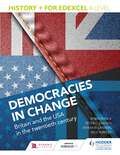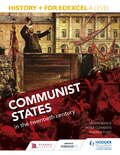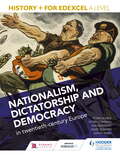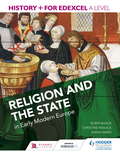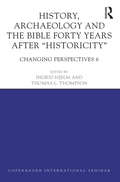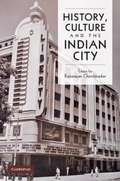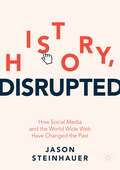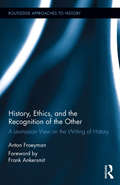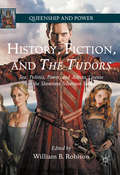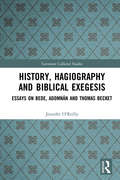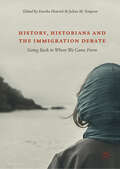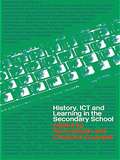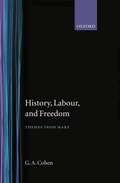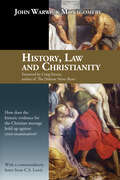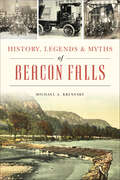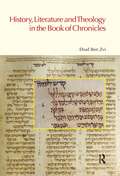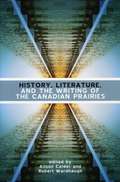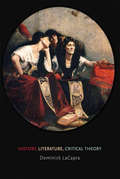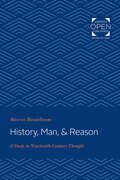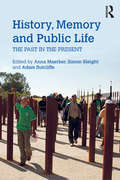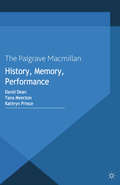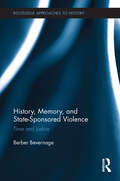- Table View
- List View
History+ for Edexcel A Level: Britain and the USA in the twentieth century
by Peter Clements Nick Shepley Vivienne SandersEndorsed for Edexcel.Enable your students to develop high-level skills in their Edexcel A level History breadth and depth studies through expert narrative and extended reading, including bespoke essays from leading academics.- Build a strong understanding of the period studied with authoritative, well-researched content written in an accessible and engaging style- Ensure continual improvement in students' essay writing, interpretation and source analysis skills, using practice questions and trusted guidance on successfully answering exam-style questions- Encourage students to undertake rolling revision and self-assessment by referring to end-of-chapter summaries and diagrams across the years- Help students monitor their progress and consolidate their knowledge through note-making activities and peer-support tasks- Provide students with the opportunity to analyse and evaluate works of real history, with specially commissioned historians' essays and extracts from academic works on the historical interpretations
History+ for Edexcel A Level: Communist States In The Twentieth Century
by Robin Bunce Peter Clements Sarah Ward Andrew FlintExam Board: EdexcelLevel: AS/A-levelSubject: HistoryFirst teaching: September 2015First exams: AS: Summer 2016; A-level: Summer 2017Endorsed for EdexcelEnable your students to develop high-level skills in their Edexcel A level History breadth and depth studies through expert narrative and extended reading, including bespoke essays from leading academics- Build a strong understanding of the period studied with authoritative, well-researched content written in an accessible and engaging style- Ensure continual improvement in students' essay writing, interpretation and source analysis skills, using practice questions and trusted guidance on successfully answering exam-style questions- Encourage students to undertake rolling revision and self-assessment by referring to end-of-chapter summaries and diagrams across the years- Help students monitor their progress and consolidate their knowledge through note-making activities and peer-support tasks- Provide students with the opportunity to analyse and evaluate works of real history, with specially commissioned historians' essays and extracts from academic works on the historical interpretations
History+ for Edexcel A Level: Communist states in the twentieth century
by Robin Bunce Peter Clements Andrew FlintEndorsed for Edexcel.Enable your students to develop high-level skills in their Edexcel A level History breadth and depth studies through expert narrative and extended reading, including bespoke essays from leading academics.- Build a strong understanding of the period studied with authoritative, well-researched content written in an accessible and engaging style- Ensure continual improvement in students' essay writing, interpretation and source analysis skills, using practice questions and trusted guidance on successfully answering exam-style questions- Encourage students to undertake rolling revision and self-assessment by referring to end-of-chapter summaries and diagrams across the years- Help students monitor their progress and consolidate their knowledge through note-making activities and peer-support tasks- Provide students with the opportunity to analyse and evaluate works of real history, with specially commissioned historians' essays and extracts from academic works on the historical interpretations
History+ for Edexcel A Level: Democracies In Change: Britain And The Usa In The Twentieth Century
by Robin Bunce Peter Clements Nick Shepley Vivienne SandersExam Board: EdexcelLevel: AS/A-levelSubject: HistoryFirst Teaching: September 2015First Exam: June 2016Endorsed for EdexcelEnable your students to develop high-level skills in their Edexcel A level History breadth and depth studies through expert narrative and extended reading, including bespoke essays from leading academics- Build a strong understanding of the period studied with authoritative, well-researched content written in an accessible and engaging style- Ensure continual improvement in students' essay writing, interpretation and source analysis skills, using practice questions and trusted guidance on successfully answering exam-style questions- Encourage students to undertake rolling revision and self-assessment by referring to end-of-chapter summaries and diagrams across the years- Help students monitor their progress and consolidate their knowledge through note-making activities and peer-support tasks- Provide students with the opportunity to analyse and evaluate works of real history, with specially commissioned historians' essays and extracts from academic works on the historical interpretations
History+ for Edexcel A Level: Nationalism, dictatorship and democracy in twentieth-century Europe
by Peter Clements Andrew Flint Mark GoslingEndorsed for Edexcel.Enable your students to develop high-level skills in their Edexcel A level History breadth and depth studies through expert narrative and extended reading, including bespoke essays from leading academics.- Build a strong understanding of the period studied with authoritative, well-researched content written in an accessible and engaging style- Ensure continual improvement in students' essay writing, interpretation and source analysis skills, using practice questions and trusted guidance on successfully answering exam-style questions- Encourage students to undertake rolling revision and self-assessment by referring to end-of-chapter summaries and diagrams across the years- Help students monitor their progress and consolidate their knowledge through note-making activities and peer-support tasks- Provide students with the opportunity to analyse and evaluate works of real history, with specially commissioned historians' essays and extracts from academic works on the historical interpretations
History+ for Edexcel A Level: Nationalism, dictatorship and democracy in twentieth-century Europe
by Robin Bunce Peter Clements Sarah Ward Andrew Flint Mark GoslingExam Board: EdexcelLevel: AS/A-levelSubject: HistoryFirst Teaching: September 2015First Exam: June 2016Endorsed for EdexcelEnable your students to develop high-level skills in their Edexcel A level History breadth and depth studies through expert narrative and extended reading, including bespoke essays from leading academics- Build a strong understanding of the period studied with authoritative, well-researched content written in an accessible and engaging style- Ensure continual improvement in students' essay writing, interpretation and source analysis skills, using practice questions and trusted guidance on successfully answering exam-style questions- Encourage students to undertake rolling revision and self-assessment by referring to end-of-chapter summaries and diagrams across the years- Help students monitor their progress and consolidate their knowledge through note-making activities and peer-support tasks- Provide students with the opportunity to analyse and evaluate works of real history, with specially commissioned historians' essays and extracts from academic works on the historical interpretations
History+ for Edexcel A Level: Religion and the state in early modern Europe
by Robin Bunce Christine Knaack Sarah WardEndorsed for Edexcel.Enable your students to develop high-level skills in their Edexcel A level History breadth and depth studies through expert narrative and extended reading, including bespoke essays from leading academics.<P><P> Build a strong understanding of the period studied with authoritative, well-researched content written in an accessible and engaging style- Ensure continual improvement in students' essay writing, interpretation and source analysis skills, using practice questions and trusted guidance on successfully answering exam-style questions- Encourage students to undertake rolling revision and self-assessment by referring to end-of-chapter summaries and diagrams across the years- Help students monitor their progress and consolidate their knowledge through note-making activities and peer-support tasks- Provide students with the opportunity to analyse and evaluate works of real history, with specially commissioned historians' essays and extracts from academic works on the historical interpretationsThis title has complete coverage of the following units in Edexcel's specification:- England, 1509-1603: authority, nation and religion - Luther and the German Reformation, c1515-55 - The Dutch Revolt, c1563-1609
History, Archaeology and The Bible Forty Years After Historicity: Changing Perspectives 6
by Thomas L. Thompson Ingrid HjelmIn History, Archaeology and the Bible Forty Years after "Historicity", Hjelm and Thompson argue that a ‘crisis’ broke in the 1970s, when several new studies of biblical history and archaeology were published, questioning the historical-critical method of biblical scholarship. The crisis formed the discourse of the Copenhagen school’s challenge of standing positions, which—together with new achievements in archaeological research—demand that the regional history of ancient Israel, Judaea and Palestine be reconsidered in all its detail. This volume examines the major changes that have taken place within the field of Old Testament studies since the ground breaking works of Thomas Thompson and John van Seters in 1974 and 1975 (both republished in 2014). The book is divided in three sections: changing perspectives in biblical studies, history and cult, and ideology and history, presenting new articles from some of the field’s best scholars with comprehensive discussion of historical, archaeological, anthropological, cultural and literary approaches to the Hebrew Bible and Palestine’s history. The essays question: "How does biblical history relate to the archaeological history of Israel and Palestine?" and "Can we view the history of the region independently of a biblical perspective?" by looking at the problem from alternative angles and questioning long-held interpretations. Unafraid to break new ground, History, Archaeology and the Bible Forty Years after "Historicity" is a vital resource to students in the field of Biblical and East Mediterranean Studies, and anyone with an interest in the archaeology, history and religious development in Palestine and the ancient Near East.
History, Culture and the Indian City: Essays
by Rajnarayan ChandavarkarRaj Chandavarkar was one of the finest Indian historians of the twentieth century. He died sadly young in 2006, leaving behind a very substantial collection of unpublished lectures, papers and articles. These have now been assembled and edited by Jennifer Davis, Gordon Johnson and David Washbrook, and their appearance will be widely welcomed by large numbers of scholars of Indian history, politics and society. The essays center around three major themes: the city of Bombay, Indian politics and society, and Indian historiography. Each manifests Dr. Chandavarkar's hallmark historical powers of imaginative empirical richness, analytic acuity and expository elegance, and the collection as a whole will make both a major contribution to the historiography of modern India, and a worthy memorial to a major scholar.
History, Disrupted: How Social Media and the World Wide Web Have Changed the Past
by Jason SteinhauerThe Internet has changed the past. Social media, Wikipedia, mobile networks, and the viral and visual nature of the Web have inundated the public sphere with historical information and misinformation, changing what we know about our history and History as a discipline. This is the first book to chronicle how and why it matters. Why does History matter at all? What role do history and the past play in our democracy? Our economy? Our understanding of ourselves? How do questions of history intersect with today’s most pressing debates about technology; the role of the media; journalism; tribalism; education; identity politics; the future of government, civilization, and the planet? At the start of a new decade, in the midst of growing political division around the world, this information is critical to an engaged citizenry. As we collectively grapple with the effects of technology and its capacity to destabilize our societies, scholars, educators and the general public should be aware of how the Web and social media shape what we know about ourselves - and crucially, about our past.
History, Ethics, and the Recognition of the Other: A Levinasian View on the Writing of History (Routledge Approaches to History #17)
by Anton FroeymanThis book introduces a new way of looking at the writing of history. Rather than as the production of knowledge or the telling of stories, it sees writing history as an ethical, existential and emotional engagement with the people from the past. The conceptual and philosophical basis for this view is provided by the philosophy of Emmanuel Levinas. In the first part, the view is presented and contrasted with other, competing views, such as those of Hans-Georg Gadamer and Michel Foucault. In the second part, the view is argued for, most importantly by an in-depth discussion of one specific tradition of history-writing (microhistory), and a series of close readings of several classical works from the history of historiography. The third part, finally, explores some of the methodological consequences of this view, and applies it to a non-academic way of dealing with the past, namely historical performance practice in music. The book features a foreword by Frank Ankersmit.
History, Fiction, and The Tudors: Sex, Politics, Power, and Artistic License in the Showtime Television Series (Queenship and Power)
by William B. RobisonThis is the first book-length study of the award-winning historical drama The Tudors. In this volume twenty distinguished scholars separate documented history, plausible invention, and outright fantasy in a lively series of scholarly, but accessible and engaging essays. The contributors explore topics including Henry VIII, Catherine of Aragon, Anne Boleyn, his other wives and family, gender and sex, kingship, the court, religion, and entertainments.
History, Hagiography and Biblical Exegesis: Essays on Bede, Adomnán and Thomas Becket (Variorum Collected Studies)
by Jennifer O'ReillyWhen she died in 2016, Dr Jennifer O’Reilly left behind a body of published and unpublished work in three areas of medieval studies: the iconography of the Gospel Books produced in early medieval Ireland and Anglo-Saxon England; the writings of Bede and his older Irish contemporary, Adomnán of Iona; and the early lives of Thomas Becket. In these three areas she explored the connections between historical texts, artistic images and biblical exegesis. <P><P> This volume is a collection of 16 essays, old and new, relating history and exegesis in the writings of Bede and Adomnán, and in the lives of Thomas Becket. The first part consists of seven studies of Bede’s writings, notably his biblical commentaries and his Ecclesiastical History. Two of the essays are published here for the first time. The five studies in the second part, devoted to Adomnán, discuss his life of Saint Columba (the Vita Columbae) and his guide to the Holy Places (De locis sanctis). One essay (‘The Bible as Map’), published posthumously, compares his presentation of a major theme, the earthly and heavenly Jerusalem, with the approach adopted by Bede. The third section consists of two essays on the lives of Thomas Becket that were composed shortly after his death. They examine, in the context of patristic exegesis, the biblical images invoked in the texts in order to show how the saint’s biographers understood the complex relationship between hagiography and history. With the exception of the Jarrow Lecture on Bede and the essays on Becket, the studies in both parts were published originally in edited books, some of them now hard to come by.
History, Historians and the Immigration Debate: Going Back to Where We Came From
by Julian M. Simpson Eureka HenrichThis book is a response to the binary thinking and misuse of history that characterize contemporary immigration debates. Subverting the traditional injunction directed at migrants to ‘go back to where they came from’, it highlights the importance of the past to contemporary discussions around migration. It argues that historians have a significant contribution to make in this respect and shows how this can be done with chapters from scholars in, Asia, Europe, Australasia and North America. Through their work on global, transnational and national histories of migration, an alternative view emerges – one that complicates our understanding of 21st-century migration and reasserts movement as a central dimension of the human condition. History, Historians and the Immigration Debate makes the case for historians to assert themselves more confidently as expert commentators, offering a reflection on how we write migration history today and the forms it might take in the future.
History, ICT and Learning in the Secondary School
by Christine Counsell Terry HaydnThis book explores the current use and potential of ICT in the secondary history curriculum, and offers sound theory and practical advice to help secondary history teachers use ICT effectively. Key areas covered include: getting started in ICT and history short, medium and long-term planning using ICT to develop historical understanding and skills data handling in the history classroom ICT and maps integrating virtual resources with the real world of teaching and learning. With contributions from leading academics and practitioners in history education, this book will be important reading for all secondary history teachers and trainee teachers, but will be of interest to upper primary school teachers too.
History, Labour, and Freedom: Themes From Marx
by G. A. CohenTaking Karl Marx's theory of history as their point of departure, these essays, extensively revised and rewritten for this volume, chronicle the growth of humanity's power to produce, and the suffering that the byproducts of this freedom--exploitation, lack of freedom, indignity--have caused. Cohen begins with a discussion and defense of historical materialism before expressing his own reservations about the theory, arguing that the truth of historical materialism is far more open than many Marxists believe. He then addresses some of the principal difficulties under which workers labor in contemporary capitalist class society, offering important new insights for all students of politics, political theory, and Marxism.
History, Law, and Christianity
by John Warwick MontgomeryA stirring defense of the faith by one of Christianity's ablest defenders, this is a re-issue of the classic "History and Christianity" expanded to include Dr. Montgomery's essay "Christianity Juridically Defended."Dr. John Montgomery, scholar, theologian and apologist for the faith, developed this book from a seminar he presented at the University of British Columbia. Readable and convincing, the book is divided into four sections:Section One deals with four basic errors usually committed by those who attack the historicity of the New Testament.Section Two defends the accuracy of the New Testament documents, using tests which are commonly applied to any ancient document.Section Three, entitled "God Closes In," is a powerful defense of the truly divine and truly human nature of Christ.Section Four clearly shows that if Jesus were not the Son of God, the only other alternatives are either liar or lunatic.The last section contains Dr. Montgomery's essay "Christianity Juridically Defended."The book includes the transcript of a panel discussion in which Dr. Montgomery convincingly argues from the above four points to demonstrate their application for the reader. Here is excellent material for class discussion or individual study, particularly suited to helping young people combat humanistic concepts of the Bible and Christianity.
History, Legends & Myths of Beacon Falls
by Michael A. KreneskyLike many New England mill towns, Beacon Falls has a history that goes back to the founding of this country. It was called "Brigadoon" by a former state senator, and its past is tied to the invention of vulcanized rubber by Charles Goodyear and the manufacture of woolen shawls for Union troops during the Civil War. Its early Native American roots tell the story of Tobe, a Narragansett Indian who owned most of the western portion of land that became the town in 1871. High Rock Grove brought ten thousand visitors each summer to enjoy the skating rink, band concerts and acclaimed scenic vistas of Long Island Sound. Local author and municipal historian Michael Krenesky reveals some of the fascinating stories behind this jewel of the Naugatuck Valley.
History, Literature and Theology in the Book of Chronicles: History, Literature And Theology In The Book Of Chronicles (BibleWorld)
by Ehud Ben ZviHistory, Literature and Theology in the Book of Chronicles presents a new way of approaching this key biblical text, arguing that the Book employs both multiple viewpoints and the knowledge of the past held by its intended readership to reshape social memory and reinforce the authority of God. The Book of Chronicles communicates to its intended readership a theological worldview built around multiple, partial perspectives which inform and balance each other. This is a worldview which emphasizes the limitations of all human knowledge, even of theologically "proper" knowledge. When Chronicles presents the past as explainable it also affirms that those who inhabited it could not predict the future. And, despite expanding an "explainable" past, the Book deliberately frames some of YHWH's actions - crucial events in Israel's social memory - as unexplainable in human terms. The Book serves to rationalise divinely ordained, prescriptive behaviour through its emphasis on the impossibility of adequate human understanding of a past, present and future governed by YHWH.
History, Literature and the Writing of the Canadian Prairies
by Alison Calder Robert WardhaughThe Canadian Prairie has long been represented as a timeless and unchanging location, defined by settlement and landscape. Now, a new generation of writers and historians challenge that perception and argue, instead, that it is a region with an evolving culture and history. This collection of ten essays explores a more contemporary prairie identity, and reconfigures "the prairie" as a construct that is non-linear and diverse, responding to the impact of geographical, historical, and political currents. These writers explore the connections between document and imagination, between history and culture, and between geography and time.The subjects of the essays range widely: the non-linear structure of Carol Shield's The Stone Diaries; the impact of Aberhart's Social Credit, Marshall McLuhan, and Mesopotamian myth on Robert Kroetsch's prairie postmodernism; the role of document in long prairie poems; the connection between cultural tourism and heritage; the theme of regeneration in Margaret Laurence's Manawaka writing; the influence of imagination on geography in Thomas Wharton's Icefields; and the effects on an alpine climber of pre-WWII ideological concepts of time and individualism.
History, Literature, Critical Theory
by Dominick LacapraIn History, Literature, Critical Theory, Dominick LaCapra continues his exploration of the complex relations between history and literature, here considering history as both process and representation. A trio of chapters at the center of the volume concern the ways in which history and literature (particularly the novel) impact and question each other. In one of the chapters LaCapra revisits Gustave Flaubert, pairing him with Joseph Conrad. Other chapters pair J. M. Coetzee and W. G. Sebald, Jonathan Littell's novel, The Kindly Ones, and Saul Friedlander's two-volume, prizewinning history Nazi Germany and the Jews. A recurrent motif of the book is the role of the sacred, its problematic status in sacrifice, its virulent manifestation in social and political violence (notably the Nazi genocide), its role or transformations in literature and art, and its multivalent expressions in "postsecular" hopes, anxieties, and quests. LaCapra concludes the volume with an essay on the place of violence in the thought of Slavoj Zizek. In LaCapra's view Zizek's provocative thought "at times has uncanny echoes of earlier reflections on, or apologies for, political and seemingly regenerative, even sacralized violence."
History, Man, and Reason: A Study in Nineteenth-Century Thought
by Maurice MandelbaumOriginally published in 1971. The purpose of this book is to draw attention to important aspects of thought in the nineteenth century. While its central concerns lie within the philosophic tradition, materials drawn from the social sciences and elsewhere provide important illustrations of the intellectual movements that the author attempts to trace. This book aims at examining philosophic modes of thought as well as sifting presuppositions held in common by a diverse group of thinkers whose antecedents and whose intentions often had little in common. After a preliminary tracing of the main strands of continuity within philosophy itself, the author concentrates on how, out of diverse and disparate sources, certain common beliefs and attitudes regarding history, man, and reason came to pervade a great deal of nineteenth-century thought. Geographically, this book focuses on English, French, and German thought. Mandelbaum believes that views regarding history and man and reason pose problems for philosophy, and he offers critical discussions of some of those problems at the conclusions of parts 2, 3, and 4.
History, Memory and Public Life: The Past in the Present
by Adam Sutcliffe Anna Maerker Simon SleightHistory, Memory and Public Life introduces readers to key themes in the study of historical memory and its significance by considering the role of historical expertise and understanding in contemporary public reflection on the past. Divided into two parts, the book addresses both the theoretical and applied aspects of historical memory studies. ‘Approaches to history and memory‘ introduces key methodological and theoretical issues within the field, such as postcolonialism, sites of memory, myths of national origins, and questions raised by memorialisation and museum presentation. ‘Difficult pasts‘ looks at history and memory in practice through a range of case studies on contested, complex or traumatic memories, including the Northern Ireland Troubles, post-apartheid South Africa and the Holocaust. Examining the intersection between history and memory from a wide range of perspectives, and supported by guidance on further reading and online resources, this book is ideal for students of history as well as those working within the broad interdisciplinary field of memory studies.
History, Memory, Performance
by Kathryn Prince David Dean Yana MeerzonHistory, Memory, Performance is an interdisciplinary collection of essays exploring performances of the past in a wide range of trans-national and historical contexts. At its core are contributions from theatre scholars and public historians discussing how historical meaning is shaped through performance.
History, Memory, and State-Sponsored Violence: Time and Justice (Routledge Approaches to History)
by Berber BevernageModern historiography embraces the notion that time is irreversible, implying that the past should be imagined as something ‘absent’ or ‘distant.’ Victims of historical injustice, however, in contrast, often claim that the past got ‘stuck’ in the present and that it retains a haunting presence. History, Memory, and State-Sponsored Violence is centered around the provocative thesis that the way one deals with historical injustice and the ethics of history is strongly dependent on the way one conceives of historical time; that the concept of time traditionally used by historians is structurally more compatible with the perpetrators’ than the victims’ point of view. Demonstrating that the claim of victims about the continuing presence of the past should be taken seriously, instead of being treated as merely metaphorical, Berber Bevernage argues that a genuine understanding of the ‘irrevocable’ past demands a radical break with modern historical discourse and the concept of time. By embedding a profound philosophical reflection on the themes of historical time and historical discourse in a concrete series of case studies, this project transcends the traditional divide between ‘empirical’ historiography on the one hand and the so called ‘theoretical’ approaches to history on the other. It also breaks with the conventional ‘analytical’ philosophy of history that has been dominant during the last decades, raising a series of long-neglected ‘big questions’ about the historical condition – questions about historical time, the unity of history, and the ontological status of present and past –programmatically pleading for a new historical ethics.
